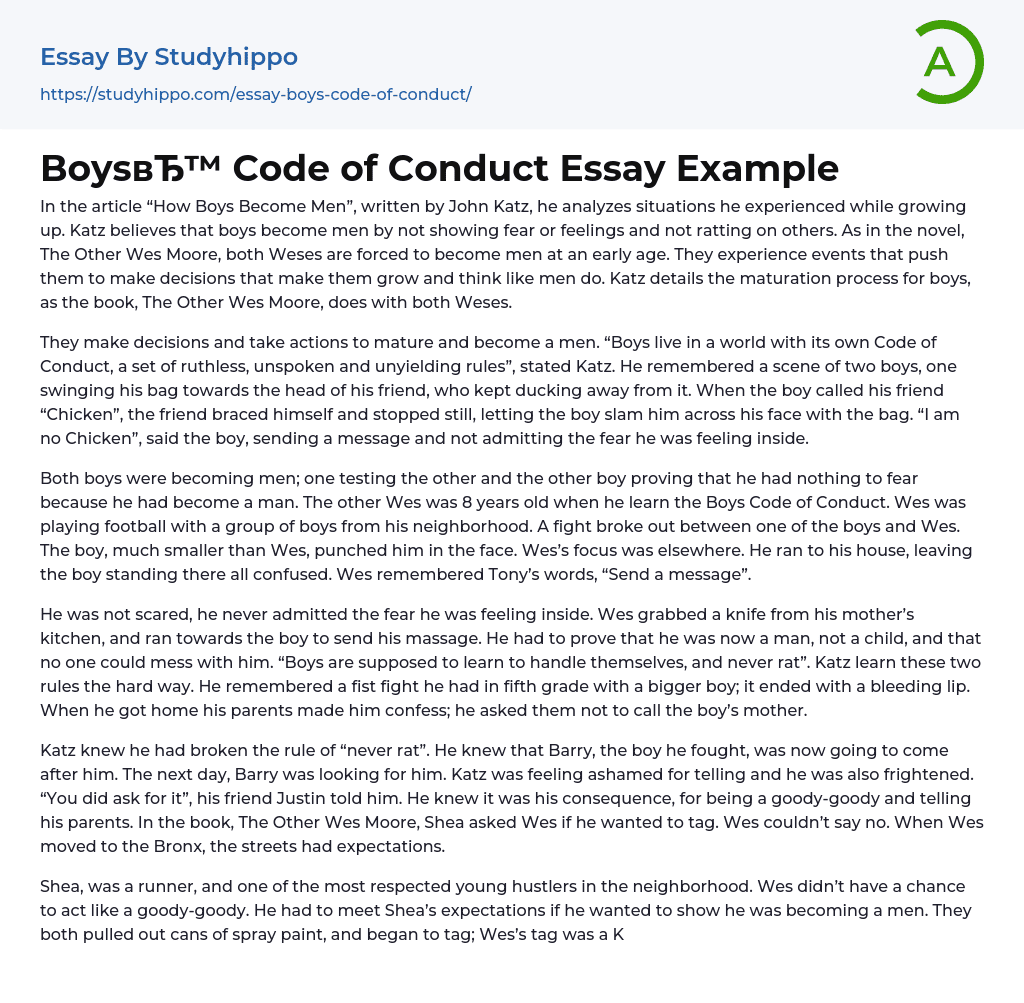
John Katz's article "How Boys Become Men" examines his personal experiences of growing up, suggesting that the transition from boys to men is marked by the suppression of fear and emotions, as well as the avoidance of ratting on others. Similar to the characters in the novel The Other Wes Moore, both Weses are compelled to mature prematurely. They encounter circumstances that compel them to make choices that foster growth and develop their mindset in a masculine manner. Katz delves into the process of maturation for boys, mirroring the exploration in The Other Wes Moore, which focuses on both Weses' journey towards adulthood.
According to Katz, boys have their own set of strict, unspoken rules that they follow as they mature into men. Katz recalled an incident where two boys were engag
...ing in a confrontation, with one swinging his bag towards the other boy's head. Despite the friend's attempts to dodge the swinging bag, he ultimately braced himself and stood still as the boy called him "Chicken" and proceeded to hit him across the face with the bag. In this moment, the boy asserted himself by stating, "I am no Chicken," effectively conveying a message and masking the fear he may have been experiencing internally.
Both boys were transitioning into adulthood, with one challenging the other and the other boy demonstrating his fearlessness as he embraced manhood. The other Wes, at the age of 8, learned about the Boys Code of Conduct. While playing football with boys from his neighborhood, a conflict erupted between Wes and another boy. Despite being smaller, the boy managed to punch Wes in the face. Wes
was distracted and quickly rushed back home, leaving the bewildered boy behind. Tony's advice, "Send a message," resonated with Wes.
He concealed his fear, refusing to acknowledge the terror festering within him. Wes took a knife from his mother’s kitchen and sprinted towards the boy, determined to deliver his message. He had a point to prove - he was no longer a child but a man, untouchable by anyone. Katz had learned these two rules through sheer hardship. Recalling a past brawl with a larger classmate in fifth grade, which had left him with a bleeding lip, he understood the importance of self-defense. Upon returning home, his parents forced him to confess and he pleaded with them not to contact the other boy's mother.
Katz was aware that he had violated the "never rat" rule and understood that Barry, whom he had fought, would seek revenge. The following day, Barry was searching for Katz. Katz felt both ashamed and frightened for snitching. His friend Justin told him, "You asked for it." Katz recognized that it was a consequence of his actions, as he was known for being well-behaved and informing his parents. In the book, The Other Wes Moore, Shea invited Wes to graffiti. Wes could not refuse. Upon his relocation to the Bronx, Wes encountered certain expectations in the streets.
Shea and Wes, two respected young hustlers in the neighborhood, both had a passion for running. Wes felt the need to meet Shea's expectations in order to prove himself as a man. Displaying their graffiti skills, they each took out cans of spray paint. Wes's tag consisted of a KK with
a circle around it. However, their spray painting session was abruptly interrupted when a police cruiser suddenly arrived on the scene. Both Shea and Wes found themselves in the back seat of the police car, leaving Wes feeling terrified and unsure of what would come next.
He was afraid of disappointing his mother, but too proud to show it. He didn't want to appear obedient. "Boys exist in a world with their own Code of conduct; a set of strict, implicit rules." Katz provides examples of how boys transition into men; they develop hardened hearts and avoid showing vulnerability. The novel, The Other Wes Moore, aligns with Katz's explanations. Both Weses conceal their emotions and develop enigmatic personalities. Both boys are faced with choices and must take actions to demonstrate maturity; to become men.
- Child essays
- Childcare essays
- Child labor essays
- Doll essays
- Pressure essays
- Confidence essays
- Disgrace essays
- Lost essays
- Harmony essays
- Fairness essays
- Sarcasm essays
- Respect essays
- Responsibility essays
- Empathy essays
- Suffering essays
- Suspense essays
- Fear essays
- Feeling essays
- Loneliness essays
- Ambition essays
- Tolerance essays
- Hope essays
- Inspiration essays
- Kindness essays
- Shame essays
- Desire essays
- Doubt essays
- Grief essays
- Hate essays
- Laughter essays
- Passion essays
- Pride essays
- Forgiveness essays
- Happiness essays
- Humanity essays
- Loyalty essays
- Guilt essays
- Honesty essays
- Betrayal essays
- Need essays
- Boredom essays
- Courage essays
- Regret essays
- Anger essays
- Honor essays
- Honesty Is The Best Policy essays
- Culture essays
- Social Control essays
- Citizenship essays
- Social Justice essays



